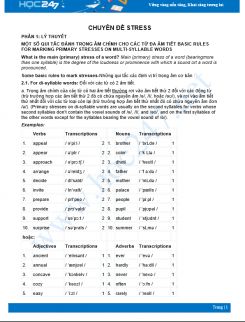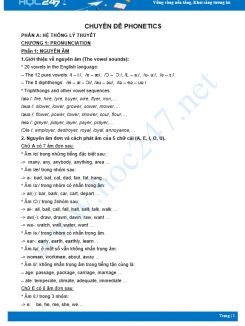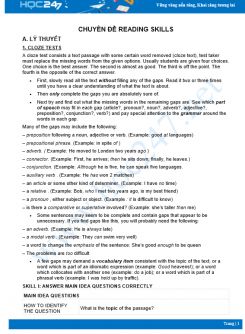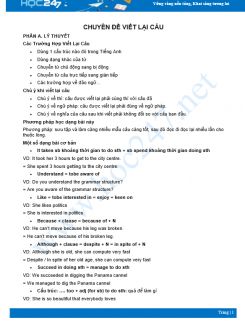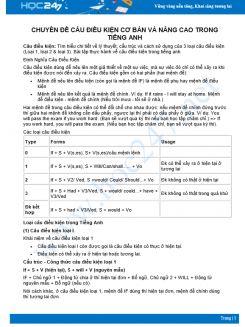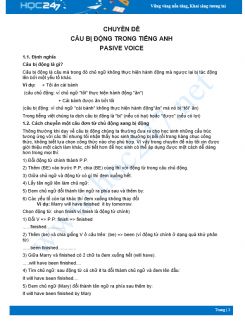Tài liệu Chuyên đề Câu giả định - Subjunctive được HOC247 biên soạn và tổng hợp giúp các em học sinh lớp 12 ôn tập kiến thức, rèn luyện chuẩn bị cho kì thi sắp tới cũng như giới thiệu đến quý thầy cô và các em học sinh tham khảo. Hi vọng tài liệu này sẽ có ích cho các em học sinh.
Mời các em học sinh và quý thầy cô cùng tham khảo.
CHUYÊN ĐỀ CÂU GIẢ ĐỊNH - SUBJUNCTIVE
PHẦN A: LÝ THUYẾT
Khái niệm:
Câu giả định hay còn gọi là câu cầu khiến là loại câu đối tượng thứ nhất muốn đối tượng thứ hai làm một việc gì. Câu giả định có tính chất cầu khiến chứ không mang tính ép buộc như câu mệnh lệnh. Trong câu giả định, người ta dùng dạng nguyên thể không có to của các động từ sau một số động từ chính mang tính cầu khiến. Thường có that trong câu giả định trừ một số trường hợp đặc biệt.
1. Dùng với would rather that
Ngữ pháp hiện đại ngày nay đặc biệt là ngữ pháp Mỹ cho phép dùng would rather mà không cần dùng that trong loại câu này.
We would rather (that) he not take this train.
2. Dùng với động từ.
Bảng sau là những động từ đòi hỏi mệnh đề sau nó phải ở dạng giả định và trong câu bắt buộc phải có that trong trường hợp đó.
|
advise |
ask |
command |
decree |
|
demand |
insist |
move |
order |
|
prefer |
propose |
recommend |
request |
|
require |
stipulate |
suggest |
urge |
Động từ sau chủ ngữ 2 ở dạng nguyên thể không chia bỏ to. Nếu muốn thành lập thể phủ định đặt not sau chủ ngữ 2 trước nguyên thể bỏ to.
|
Subject + verb + that + subject + [verb in simple form] + … |
The doctor suggested that his patient stop smoking.
The doctor suggested that his patient not stop smoking.
Nếu bỏ that đi thì chủ ngữ 2 sẽ trở về dạng tân ngữ và động từ sau nó trở về dạng nguyên thể có to, câu mất tính chất giả định, trở thành một dạng mệnh lệnh thức gián tiếp.
The doctor suggested his patient to stop smoking.
The doctor suggested his patient not to stop smoking.
Trong ngữ pháp Anh-Anh trước động từ ở mệnh đề 2 thường có should, người Anh chỉ bỏ should khi sau nó là động từ to be nhưng ngữ pháp Anh-Mỹ không dùng should cho toàn bộ động từỏơ mệnh đề 2.
3. Dùng với tính từ.
Bảng sau là một số các tính từ đòi hỏi mệnh đề sau nó phải ở dạng giả định, trong câu bắt buộc phải có that và động từ sau chủ ngữ 2 ở dạng nguyên thể bỏ to.
|
advised necessary recommended urgent |
important obligatory required imperative |
mandatory proposed suggested |
Lưu ý rằng trong bảng này có một số tính từ là phân từ 2 cấu tạo từ các động từ ở bảng trên. Nếu muốn cấu tạo phủ định đặt not sau chủ ngữ 2 trước nguyên thể bỏ to.
|
It + be + adj + that + S + [verb in simple form] |
It is necessary that he find the books.
It is necessary that he not find the books.
It has been proprosed that we change the topic.
It has been proprosed that we not change the topic.
Nếu bỏ that đi thì chủ ngữ 2 sẽ biến thành tân ngữ sau giới từ for, động từ trở về dạng nguyên thể có to và câu mất tính chất giả định trở thành dạng mệnh lệnh thức gián tiếp.
It is necessary for him to find the books.
It is necessary for him not to find the books.
It has been proprosed for us to change the topic.
It has been proprosed for us not to change the topic.
Lưu ý:
- Câu giả định dùng với 2 loại trên thường được dùng trong các văn bản hoặc thư giao dịch diễn đạt lời đề nghị từ phía A -> B mà không có tính bắt buộc.
- Không chỉ có động từ và tính từ mới được dùng theo dạng này, tất cả các danh từ xuất phát từ những động từ và tính từ trên đều buộc mệnh đề sau nó phải ở dạng giả định, nếu như nó diễn đạt các yếu tố trên.
There is suggestion from the doctor that the patient stop smoking.
It is recommendation that the vehicle owner be present at the court
4. Thể giả định trong một số trường hợp khác
– Dùng để diễn đạt một ước muốn hoặc một lời nguyền rủa, thường bao hàm các thế lực siêu nhiên.
God be with you = Good bye.
Curse this toad: Chết tiệt cái con cóc này.
– Dùng với động từ May trong một số trường hợp đặc biệt sau:
+ Come what may = Dù thế nào chăng nữa, dù bất cứ truyện gì.
Come what may we will stand by
+ May as well not do sth …. if …. = Có thể đừng….. nếu không.
You may as well not come if you can’t be on time.
Các anh có thể đừng đến nếu không đến được đúng giờ.
+ May/Might (just) as well do smt = Chẳng mất gì mà lại không, mất gì của bọ.
Since nobody wants that job, we might (just) as well let him have it:
Vì không ai thích việc này, mình chẳng mất gì mà lại không cho hắn ta làm nó
+ May diễn đạt một lời đề nghị mà người nói cho rằng chưa chắc nó đã được thực hiện:
The sign on the lawn says clearly that people may not walk on the grass.
(không dùng should trong trường hợp này).
+ May + S + link verb + adj hoặc May + S + verb + complement (Cầu chúc cho).
May you both very happy: Chúc các bạn bách niên giai lão.
May the conference be successful: Chúc hội nghị thành công rực rỡ.
Long may she live to enjoy her good fortune: Chúc cho nàng sống lâu để hưởng vận may của nàng.
– If need be = If necessary = Nếu cần
If need be, we can take another road.
– Dùng với động từ to be, bỏ to sau if để chỉ một sự giả định chưa được phân định rõ ràng là đúng hay
If that be right, then it would be no defence for this man to say he’s innocent.
– Let it be me: Giả sử đó là tôi, giá phải tay tôi.
Husband: Let it be
Wife (suddenly appearing) : If that be you, what would you
– Be that as it may… = whether that is true or not… = Cho dù là phải thế hay không.
Be that as it may, you have to accept
– Then so be it: Cứ phải vậy thôi.
If we have to pay $2,000, then so be it (thì cứ phải trả thôi)
– Câu giả định dùng với it + to be + time
+ It’s time (for sb) to do smt: đã đến lúc ai phải làm gì (Thời gian vừa vặn, không mang tính giả định).
It’s time for me to get to the airport: Đã đến lúc tôi phải ra sân bay.
+ It’s time (hightime/about time) (for sb) did smt: đã đến lúc mà (thời gian đã trễ, mang tính giả định)
It’s time I got to the airport
It’s hightime the city government did smt to stop the traffic jam.
PHẦN B: VÍ DỤ
1. I enjoyed the movie very much. I wish I ______ the book from which it was made.
A. have read
B. had read
C. should have read
D. am reading
2. You are late. If you _______ a few minutes earlier, you_______him.
A. came / Would meet
B. had come / Would have met
C. come / Will meet
D. had come / would meet
3. I can’t stand him. He always talks as though he_______everything.
A. knew
B. knows
C. has know
D. had known
4. His doctor suggested that he ______short trip abroad.
A. will take
B. would take
C. take
D. took
5. We might have failed if you _______us a helping hand.
A. have not given
B. would not give
C. had not given
D. did not give
6. The law requires that everyrone ______his car checked at least once a month.
A. has B. have C. had D. will have
7. He was busy yesterday, otherwise he_______to the meeting.
A. would come B
. would have been
C. could have been
D. would be
8. If there were no subjunctive mood, English _______ much easier.
A. will be
B. would have been
C. could have been
D. would be
9. ________ the fog, we should have reached our schoo1.
A. Because of
B. In spite of
C. In case of
D. But for
10. –“What will you do during winter vacation?”
–“I don’t know, but it’s about time______something.”
A. I decided
B. I’ll decide
C. I’d decided
D. I’m deciding
11. He was very busy yesterday, otherwise, he ________to your birthday party.
A. would come B. came
C. would have come D. should come
12. The two strangers talked as if they_______friends for years.
A. should be B. had been C. have been D. were
13. Look! What you’ve done!You_______have been more careful.
A. should B. may C. ought D. would
14. Without electricity, what _______?
A. will the world be like
B. would the world be like
C. the world will be like
D. the World Would be like
15. With your ability, you _______out the puzzle within a few minutes.
A. could have worked
B. need have worked
B. C. ought have worked
D. must have worked
16. My suggestion is that the sick boy_______to hospital as soon as possible.
A. is taken B. must be taken C. be taken D. has to be taken
17. If we had not missed the bus, we_______lunch at home now.
A. would have had B. would have C. must be having D. would be having
18. _______ here yesterday, he would attend the lecture with us today.
A. Had he been B. If he were C. Were he D. Should be he
19. His tired face suggested that he_______really tired after the 1ong walk.
A. had been B. was C. be D. should be
20. Do you feel that I_______the problem in a different way the other day?
A. should come B. should have solved C. have solved D. solved
21. 0ur chairman hasn’t come yet. If he _______on time, we would have to put off the meeting.
A. should come B. would come C. shouldn’t come D. doesn’t come
22. He insisted that he _______ really very tried and that he _______to have a rest.
A. was / be allowed B. was / must be allowed
C. should be / must be allowed D. should be / be allowed
23. He did his best in everything / _______he would not have been what he was.
A. and B. but C. otherwise D. but that
24. I do_______ I could give you a hand.
A. hope B. wish C. expect D. think
25. I Would rather she_______ tomorrow than today.
A. come B. came C. should D. has come
26. The guard at the gate insisted that everybody_______the rules.
A. obeys B. obey C. will obey D. Would obey
27. I _______her if I thought she would understand.
A. would tell B. will tell C. Would have to tell D. told
28. The teacher requires Rose _______by heart 15 English words each day.
A. earn B. to learn C. must learn D. 1earning
29. –“If he ________, he ________that food.”
–“Luckily he was sent to the hospital immediate1y.”
A. Was warmed / would not take
B. had been warmed / wou1d not have taken
C. would be warmed / had not taken
D. would have been warmed / had not taken
30. Without electricity human life_______quite different today.
A. is B. will be C. would have been D. Would be
ĐÁP ÁN
|
1. B 2. B 3. A 4. C 5. C 6. B |
7. B 8. D 9. D 10. A 11. C 21. B |
13. A 14. B 15. A 16. C 17. D 18. A |
19. B 20. D 21. C 22. A 23. C 24. B |
25. B 26. B 27. C 28. B 29. B 30. D |
PHẦN C: BÀI TẬP VẬN DỤNG
Exercise 1: Chọn đáp án đúng
1. It is important that you ….. your teeth twice a day.
A. brushed
B. brushing
C. bursh
D. will bursh.
2. My mother would rather that my sister ….. how to play the piano
A. learns
B. learn
C. will learn
D. has learned
3. I would rather I ….. my phone at home yesterday.
A. don’t leave
B. didn’t leave
C. haven’t left
D. hadn’t left
4. It is the time Peter ….. to the doctor.
A. went
B. go
C. goes
D. must go
5. The leader moved that the party ….. moved to next month.
A. be
B. will
C. is
D. was
6. Alice asked that all of us ….. her when she travels in Viet Nam.
A. will
B. are going to visit
C. visited
D. visit
7. If this ….. proven right, you would be considered innocent.
A. is
B. be
C. was
D. were
8. The law requires that everyone …… his car checked at least once a month.
A. has
B. have
C. will have
D. had
9. It is a ….. from his doctor that he ….. short trip abroad.
A. suggest/take
B. suggestion/will take
C. suggest/take
D. suggestion/take
10. –“What will you do during winter vacation?”
–“I don’t know, but it’s about time I ….. something.”
A. decide
B. decided
C. will decide
D. am deciding
ĐÁP ÁN
1. C
2. B
3. D
4. A
5. A
6. D
7. B
8. B
9. D
10. B
Exercise 2: Chọn đáp án đúng
1. I enjoyed the movie very much. I wish I ______ the book from which it was made.
A. have read
B. had read
C. should have read
D. am reading
2. You are late. If you _______ a few minutes earlier, you_______him.
A. came / Would meet
B. had come / Would have met
C. come / Will meet
D. had come / would meet
3. I can’t stand him. He always talks as though he_______everything.
A. knew
B. knows
C. has know
D. had known
4. His doctor suggested that he ______short trip abroad.
A. will take
B. would take
C. take
D. took
5. We might have failed if you _______us a helping hand.
A. have not given
B. would not give
C. had not given
D. did not give
6. The law requires that everyrone ______his car checked at least once a month.
A. has
B. have
C. had
7. He was busy yesterday, otherwise he_______to the meeting.
A. would come
B. would have been
C. could have been
D. would be
D. will have
8. If there were no subjunctive mood, English _______ much easier.
A. will be
B. would have been
C. could have been
D. would be
9. ________ the fog, we should have reached our schoo1.
A. Because of
B. In spite of
C. In case of
D. But for
10. –“What will you do during winter vacation?”
–“I don’t know, but it’s about time______something.”
A. I decided
B. I’ll decide
C. I’d decided
D. I’m deciding
11. He was very busy yesterday, otherwise, he ________to your birthday party.
A. would come
B. came
C. would have come
D. should come
12. The two strangers talked as if they_______friends for years.
A. should be
B. had been
C. have been
D. were
13. Look! What you’ve done!You_______have been more careful.
A. should
B. may
C. ought
D. would
14. Without electricity, what _______?
A. will the world be like
C. the world will be like
B. would the world be like
D. the World Would be like
15. With your ability, you _______out the puzzle within a few minutes.
A. could have worked
B. need have worked
B. C. ought have worked
D. must have worked
16. My suggestion is that the sick boy_______to hospital as soon as possible.
A. is taken
B. must be taken
C. be taken
D. has to be taken
17. If we had not missed the bus, we_______lunch at home now.
A. would have had B. would have
C. must be having D. would be having
18. _______ here yesterday, he would attend the lecture with us today.
A. Had he been
B. If he were
C. Were he
D. Should be he
19. His tired face suggested that he_______really tired after the 1ong walk.
A. had been
B. was
C. be
D. should be
20. Do you feel that I_______the problem in a different way the other day?
A. should come
B. should have solved C. have solved
D. solved
21. Our chairman hasn’t come yet. If he _______on time, we would have to put off the meeting.
A. should come
B. would come
C. shouldn’t come
D. doesn’t come
22. He insisted that he _______ really very tried and that he _______to have a rest.
A. was / be allowed
B. was / must be allowed
C. should be / must be allowed
D. should be / be allowed
23. He did his best in everything / _______he would not have been what he was.
A. and
B. but
C. otherwise
D. but that
24. I do_______ I could give you a hand.
A. hope
B. wish
C. expect
D. think
25. I Would rather she_______ tomorrow than today.
A. come
B. came
C. should
D. has come
26. The guard at the gate insisted that everybody_______the rules.
A. obeys
B. obey
C. will obey
D. Would obey
27. I _______her if I thought she would understand.
A. would tell
B. will tell
C. Would have to tell
D. told
28. The teacher requires Rose _______by heart 15 English words each day.
A. 1earn
B. to learn
C. must learn
D. earning
29. –“If he ________, he ________that food.”
–“Luckily he was sent to the hospita1 immediate1y.”
A. Was warmed / would not take
B. had been warmed / wou1d not have taken
C. would be warmed / had not taken
D. would have been warmed / had not taken
30. Without electricity human life_______quite different today.
A. is
B. will be
C. would have been
D. Would be
ĐÁP ÁN
1. B 2. B 3. A 4. C 5. C 6. B 7. B 8. D 9. D 10. A
11. C 21. B 13. A 14. B 15. A 16. C 17. D 18. A 19. B 20. D
21. C 22. A 23. C 24. B 25. B 26. B 27. C 28. B 29. B 30. D
Trên đây là một phần trích đoạn nội dung Chuyên đề Câu giả định - Subjunctive. Để xem thêm nhiều tài liệu tham khảo hữu ích khác các em chọn chức năng xem online hoặc đăng nhập vào trang hoc247.net để tải tài liệu về máy tính.
Hy vọng tài liệu này sẽ giúp các em học sinh ôn tập tốt và đạt thành tích cao trong học tập.
Mời các em tham khảo các tài liệu có liên quan:
Chúc các em học tập tốt!






